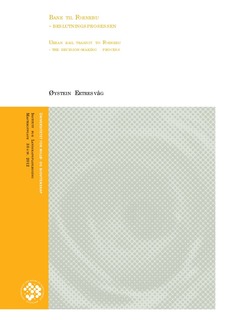| dc.contributor.author | Ertresvåg, Øystein | |
| dc.date.accessioned | 2013-03-21T15:48:48Z | |
| dc.date.available | 2013-03-21T15:48:48Z | |
| dc.date.copyright | 2012 | |
| dc.date.issued | 2013-03-21 | |
| dc.identifier.uri | http://hdl.handle.net/11250/188381 | |
| dc.description | Masteroppgave i By- og regionplanlegging | no_NO |
| dc.description.abstract | Sammendrag: Hvordan har uenighet om baneløsning påvirket beslutningsprosessen til Fornebubanen? Spørsmålet forsøkes besvart med et case-studie av beslutningsprosessen ved hjelp av Flyvbjergs teori om «rationalitet og magt» (Flyvbjerg 1991). Om den formelle, rasjonelle planprosessen ikke tar hensyn til de underliggende maktforholdene mellom aktørene, vil planprosessen bli undergravet av uoffisielle, ikke-rasjonelle beslutninger som dreier planprosessen i en annen retning enn tiltenkt. De involverte aktørene for valg av baneløsning til Fornebu blir sett i kontekst av organiseringen av kollektivplanlegging i Oslo og Akershus. I case-studiet analyseres beslutningsprosessen for tre baneløsninger for Fornebu; jernbane, automatbane og metro. Fragmentert planansvar mellom ulike aktører og myndigheter samt uklarhet om rammen rundt finansiering og valg av baneløsning har tilrettelagt for maktmisbruk og svekket rasjonaliteten i beslutningsprosessen. Abstract: What are the ways disputes have affected the decision-making process of choosing an urban rail transit mode for Fornebu? The question is analyzed using the theory and methods described by Flyvbjerg (1991) in “rationality and power”. If the institutionalized, rational planning process does not take into account the mechanisms of power in relations between participants, the planning process itself will be negatively affected by non-rational decisions and yielding to the use of power. The planning governance in Oslo and Akershus regional counties is used as a context to describe the decision-making process of urban rail transit to Fornebu. Three modes of urban rail transit are further investigated: Rail, suspended light rail and metro. Political and administrative fragmentation of strategic planning and uncertainties regarding the funding and choice of urban rail transit mode has weakened the rationality of the decision-making process. | no_NO |
| dc.description.sponsorship | Statens vegvesen region øst | no_NO |
| dc.language.iso | nob | no_NO |
| dc.publisher | Norwegian University of Life Sciences, Ås | |
| dc.subject | Fornebu | no_NO |
| dc.subject | Fornebubanen | no_NO |
| dc.subject | beslutningsprosess | no_NO |
| dc.subject | baneløsning | no_NO |
| dc.subject | Flyvbjerg | no_NO |
| dc.subject | makt | no_NO |
| dc.subject | rasjonalitet | no_NO |
| dc.subject | kollektivplanlegging | no_NO |
| dc.subject | kollektivtransport | no_NO |
| dc.title | Bane til Fornebu : beslutningsprosessen | no_NO |
| dc.title.alternative | Urban rail transit to Fornebu : the decision-making process | no_NO |
| dc.type | Master thesis | no_NO |
| dc.subject.nsi | VDP::Social science: 200::Urbanism and physical planning: 230::Building and regulation planning: 234 | no_NO |
| dc.subject.nsi | VDP::Social science: 200::Urbanism and physical planning: 230::Planning history, planning theory and planning methodology: 231 | no_NO |
| dc.source.pagenumber | 104 | no_NO |
